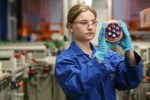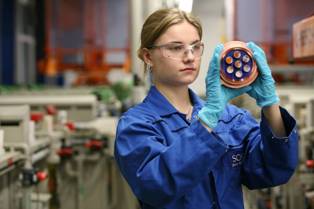South Korea’s economy is growing and so is the demand for energy. At present, four nuclear power plants supply approximately 45% of the country’s electrical consumption. By 2021, the national electric utility provider – Korea Electric Power Corporation (KEPCO) and the Korea Hydro & Nuclear Power (KHNP) plan to put another twelve reactors into operation. In addition, South Korea is seeking to increase the export levels of its exemplary nuclear technology. Jordan and the United Arab Emirates are among the first customers. Safety is one of the top priorities for the nuclear energy industry. SCHOTT’s unique glass-to-metal sealed electrical penetrations are considered the highest safety standard available in the respective component category. EPAs serve as a hermetic feedthrough for power, control, and instrumentation cables into the containment structures of nuclear power plants. To date, SCHOTT has supplied more than 12,000 EPAs, which have been installed in around 100 nuclear power plants in Europe, South America, and Asia. These compression glass-to-metal sealed feedthroughs consist of metal conductors, a glass sealant and a metal housing. The preassembled component is heated up to a temperature at which the glass melts to the metal. During the cooling process, the metal housing contracts to a much greater extent than the glass does. This compression creates a highly pressure-resistant, hermetically sealed unit that does not age and ensures the highest safety level. “Quality and superior technology have always been the keys to success. This is especially true when it comes to safety critical components for the nuclear energy sector,” says Thomas Fink, General Manager of the Nuclear Safety Division at SCHOTT Electronic Packaging in Landshut, Germany. “We are very pleased to be qualified by our South Korean customers and look forward to working together closely on adapting our technology to meet the most demanding requirements,” he adds. As a business unit of the international technology group SCHOTT, Electronic Packaging (EP) is a leading manufacturer of housings and other components for the reliable, long-term protection for sensitive electronics. The core technologies are glass-to-metal and ceramic-to-metal sealing, thermal sensing components as well as a variety of cutting edge specialty glass competences. With 1,500 employees at five production locations and several competence centers around the world, local customer support and co-developments for individual packaging solutions are at the heart of the business, serving the world’s leading manufacturers in the automotive, data- and telecommunication, sensors and semiconductors, consumer electronics, dental care, home appliances, laser as well as security and tracking industries. www.schott.com/epackaging


